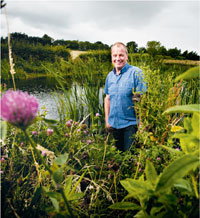2010 FW Awards: Countryside Farmer of the Year finalist – Graham Warburton

The sound of children chatting and laughing is almost as common as the hum of tractors on the Warburtons farm in Cheshire, with almost no week during the year free of a school visit.
The combined 344ha (850 acres) of Depmore Farm and nearby Hatley Farm in Kingsley, Cheshire, make up holdings of the Warburton Family who grow 140ha of wheat, 50ha of barley, 65ha of oilseed rape, 35ha of potatoes and graze 120-130 head of cattle.
A mix fertile and low yielding land lead the Warburtons to look entry level stewardship in 2005. They wanted to remove their unproductive portions of land, using it to encourage wildlife back to the farm.
“There were places which we would sow in the autumn but they would just flood up in the winter, so now it just makes more sense to have them as grassland,” says Graham.
FWAG and Natural England were both brought on to farm before the Warburtons entered ELS, so they could put forward ideas.
From these they have they have moved to protect two Sites of Biological Importance, using rotational scrub control to promote invertebrate life and working to encourage bird life and water vole numbers.
Some of the grassland is grazed by beef cattle but some parcels of land are being used to create pollen and nectar flower meadows which should encourage bees and butterflies and other wildlife.
Small nesting boxes have been laid out across the farm to attract a variety of birds such as tree sparrows and larger boxes have been placed on stilts for barn owls.
The Warburtons have also undertaken hedge management and re-layed over 2000m of hedges since 2006 – 1200m of which was last year alone. These provide habitat for birds and small mammals and passageways for animals to move across the farm.
They have also recreated nature trails through a wood on the farm and set out LEAF information boards to explain to members of the public about the environment and the work of farmers.
But the family’s passion is opening their farm to local schools and the Warburtons will have hosted 93 school visits alone by October this year. They also took part in Open Farm Sunday, which drew more than 500 visitors.
The majority of the visits have come from schools with students suffering from autism or other learning disabilities, and this has seen Graham’s wife, Liz, undertake special training courses in dealing with disabled children.
“Education has opened new opportunities for us – from meeting new people in the village, to financial opportunities and ways we can better manage the environment,” says Liz.
The “Warbies Cheshire” potatoes that are grown on farm are a recognised local label which they have been able to develop, mainly for their new potatoes. Later production is sold through merchants for chipping or out the farm gate.
All the beef grown on the farm is sold in a local cattle market and then goes on to butcher within the area.
Over half the wheat and barley grown on the farm is sold to a neighbouring pig farmer who then sprays manure from the pig farm on the Warburtons’ fields, reducing their fertiliser bill considerably.
As the farm falls in a NVZ area they have completed a manure management plan and don’t believe they will have any problems with nutrient run-off.
In the school room photos line the walls of the family planting potatoes by hand going back to the early 1880s, when they started on the land.
Now Graham’s mother, sister-in-law, brother, wife and their son and nephew all work on the farm, from staffing the farm shop to working in the fields, showing school groups around and hosting farm visitors.
“At first we didn’t think we would have anything they would want to see but then we realised we have exactly what they wanted to see.”
Farm Facts
• 344ha
• Potatoes, wheat, barley, rapeseed, 130 head of cattle
• Half of wheat and barley sold locally to other farmers
The judges liked
• Real sense of commitment to the farm from the family
• Close involvement in the local community
• Over 90 school visits in 2010
• 2000m of hedges planted in four years
• Writes a regular piece for the local paper about the farm
• For more on the 2010 Farmers Weekly Awards
• For more on the 2010 finalists
